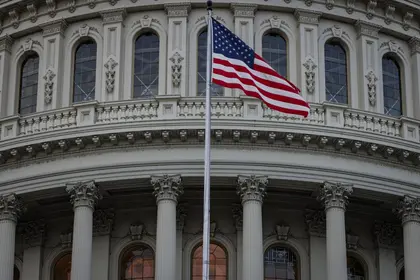Less than two months since the US federal government narrowly avoided running out of funding, the deeply divided Congress once again faces a tight deadline to approve a new budget -- just one week.
Neither the Democratic-controlled Senate or the Republican-led House of Representatives has passed a bill to extend government funding, which expires at midnight next Friday into Saturday.
JOIN US ON TELEGRAM
Follow our coverage of the war on the @Kyivpost_official.
Without an agreement by November 17, the world’s largest economy will instantly begin pumping the brakes: 1.5 million government employees will go without pay, most federal facilities including national parks will be closed, and sectors such as air travel could be forced to slow down.
Most elected officials on either side of the aisle hope to avoid this extremely unpopular outcome -- the so-called “government shutdown.”
- New speaker risks job -
The last time Congress faced a funding deadline, at the end of September, it was was plunged into chaos.
Republican allies of former president Donald Trump, furious that their leadership reached a deal with Democratic President Joe Biden to extend funding, successfully moved to oust House speaker Kevin McCarthy.
McCarthy’s unprecedented removal left the lower chamber paralyzed for almost three weeks while Republicans struggled to find a new leader, even as global events such as the deadly Hamas attack on Israel and war in Ukraine spurred calls for quick congressional action.

‘Europe Must Stand Up’ – EU Lawmakers Clash Over Trump’s Return, Musk’s Political Meddling
The party eventually chose as its new speaker Mike Johnson, a little-known representative from Louisiana with only limited leadership experience.
He has not yet explicitly stated how he intends to avoid a shutdown.
Like his predecessor, Johnson will face a delicate juggling act, balancing the demands of a small but influential group of hardline Republicans who want strict fiscal tightening, with Democrats who control both the Senate and White House.
“The only way we avoid a shutdown is with bipartisan cooperation, just as it was true in September and it will be true in the future,” said top Senate Democratic Chuck Schumer on Thursday.
- Debt crisis in June -
Washington is now well-acquainted with these last-minute battles over funding, and often finds a compromise just before the deadline, or shortly after.
In fact, the Republican representative who launched the campaign to oust McCarthy cited the September agreement as his “last straw.”
The United States experienced its longest shutdown during the Trump presidency, for several weeks beginning in December 2018, at a cost to the country’s GDP estimated to be over $3 billion.
In June, the United States faced a race against the clock to raise the nation’s borrowing limit, risking an unprecedented default on the US debt.
Under the agreement struck between then-speaker McCarthy and the White House, the so-called debt limit will not be reached again until after the November 2024 elections.
You can also highlight the text and press Ctrl + Enter










